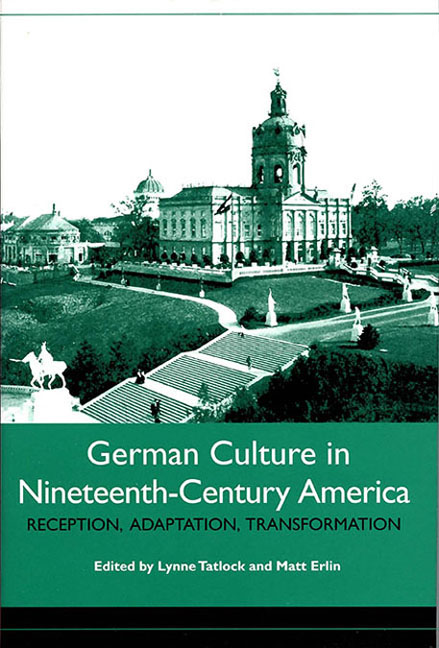Book contents
- Frontmatter
- Contents
- List of Illustrations
- Acknowledgments
- Introduction
- 1 Cultural Politics at the Turn of the Twentieth Century
- 2 In Pursuit of Intellectual Culture
- 3 Translation American Style
- Domesticated Romance and Capitalist Enterprise: Annis Lee Wister's Americanization of German Fiction
- Pictures of Travel: Heine in America
- Retroactive Dissimilation: Louis Untermeyer, the “American Heine”
- A Tramp Abroad and at Home: European and American Racism in Mark Twain
- 4 Immigration and Naturalization Acts
- Contributors
- Index
Pictures of Travel: Heine in America
from 3 - Translation American Style
Published online by Cambridge University Press: 13 April 2017
- Frontmatter
- Contents
- List of Illustrations
- Acknowledgments
- Introduction
- 1 Cultural Politics at the Turn of the Twentieth Century
- 2 In Pursuit of Intellectual Culture
- 3 Translation American Style
- Domesticated Romance and Capitalist Enterprise: Annis Lee Wister's Americanization of German Fiction
- Pictures of Travel: Heine in America
- Retroactive Dissimilation: Louis Untermeyer, the “American Heine”
- A Tramp Abroad and at Home: European and American Racism in Mark Twain
- 4 Immigration and Naturalization Acts
- Contributors
- Index
Summary
The title given here — alluding to one of the translated titles of Heine's Reisebilder but also to the changing images of Heine as he moved through America in the nineteenth century — only partly suggests the point of this article. An alternative title might be “The Domestication of Heinrich Heine in America.” That title suggests itself both because of the intense attraction in America to Heine's work beginning in the mid-nineteenth century and continuing up to the First World War and beyond and because so many readers found his work to be deeply troubling, a point that prompted them to try to domesticate what George Eliot called Heine's irreverent “wild” side. How, for instance, does one reconcile Longfellow's claim in his influential anthology Poets and Poetry of Europe (1845) that “throughout his [Heine's] writings are seen traces of a morbid ill-regulated mind,” that Heine wrote of others with “implacable hatred,” that his writing never rose above self-indulgent, melancholy tones and that in it the “lofty air” and the “power of truth” are wanting with the claim by Heine's most prolific nineteenth-century American translator in the preface to his English rendition of the Reisebilder (1855), that, as a matter of “unanimous” judgment, “we have before us, that rarest and most brilliant phenomenon — a true genius — and one who, as such, imperatively demands the attention of all who lay claim to information and intelligence”?
To search for a genuine reconciliation among such claims would probably prove an exercise in futility, but the conflicts encoded in them point to a more fundamental effect of Heine's writing, namely its capacity in North America no less than in Germany to elicit opposing responses — and often vehemently so — among professional readers, and often within one and the same reader. By professional readers I mean especially those readers who produced rewritings of Heine, to borrow a term from the late translation theorist André Lefevere. The term rewritings refers here to literary histories, criticism, reviews, translations, anthologies, editions, and so forth — that is, those works that sought to present Heine to American audiences, including for the purposes of this analysis those rewritings originally produced in England that were eventually published in the United States or, as in the cases of Matthew Arnold and George Eliot, received there.
- Type
- Chapter
- Information
- German Culture in Nineteenth-Century AmericaReception, Adaptation, Transformation, pp. 183 - 210Publisher: Boydell & BrewerPrint publication year: 2005

